- Home
- Chaim Potok
The Gates of November Page 18
The Gates of November Read online
Page 18
Those friends, skilled engineers and scientists trained in the finest institutes in the Soviet Union, had talked during the early years of their friendship about what they thought were the real reasons Khrushchev had delivered his secret speech; about their samizdat reading; and, in later years, about the arrests and trial of Daniel and Sinyavsky; about rumors of Jews leaving from border cities of the Soviet Union to be reunited with their families in Israel. At first it was only a few Russians talking about a few other Russians, all the discourse plainly illegal. The sole reason for their interest in those outside events: curiosity. They had no wish to join any movements, not the least inclination to enter the perilous arena of party politics. In the beginning there were no activists among those friends; they were merely a few young inquisitive people who only wanted to talk.
Then, gradually over the years, inside the ambience of intimacy and safety they created for themselves, they began to widen the landscape of their curiosity, tentatively extending it at times to take in Israel, where, they understood, there were collective farms known as kibbutzim. How did the kibbutz compare with the Soviet Unions kolkhoz? the friends wondered. And they listened to the Voice of Israel, drawn from the air by the radios they carried into the forests and on summer journeys.
In the early years they had no feeling that they were anything other than Russians, no connectedness to Israelis. Only David and Noya Drapkin kept insisting that they were all part of one people. The others maintained that if they were Jews at all, they were Russian Jews and had nothing to do with Israel; but yes, wasn’t it interesting what the Israelis were trying to build, their clearly thriving collective farms, their strong citizen army, their socialist government, their open society?
As the years went by, with no abatement of anti-Semitism, some among the friends ventured to wonder aloud from time to time if they were really part of the world of Russia. And soon others began to murmur to one another about the twilight land they inhabited. No real sense anymore of who they truly were: Russians, Jews, what?
It was clear by now that the chauvinistic Slavic groups would never accept them as part of the Russian people.
They said to one another, “Even if we tell them we’re Russian, they tell us we’re Jews.” “Are we ever invited to any of their parties? And even if we were invited, would we go?” “Maybe during and right after the war, yes, we would have gone. Then there was the feeling we were all one country, one people. That was the only time I ever felt like a whole person and not one part of me Russian, another part of me Jewish. But then, after the arrest of the Jewish Anti-Fascist Committee, the shooting of the Yiddish writers, the ‘Doctors’ Plot,’ the endless articles condemning Jews—no, we wouldn’t go. The long history of anti-Semitism in this country has really turned us into a separate people.”
A friend once wondered aloud, “What if there had been no anti-Semitism at all?”
Volodya said, “Then we would have joined the country as another nationality and vanished, and my father’s dream would have come true.”
Masha agreed. There had been many intermarriages during and right after the war, when it seemed the dream was becoming real. Now, fewer and fewer.
“Why haven’t the Russians seen that?” someone murmured.
“Because they hate us too much,” said Masha.
And one day, in 1965, she suddenly and clearly saw herself and her family emigrating to Israel, an idea she had only vaguely conjured up before. She mentioned it to Volodya, who thought her impulsive, a woman, a dreamer.
And sometime during the final weeks of the summers of 1965 and 1966, one of the friends said he was going to the Simchat Torah celebration in the Moscow synagogue and did Volodya want to come along, and Volodya said it was not a good idea, the KGB and militia would be there, too, and he didn’t want to jeopardize his security clearance.
Only decades later did Volodya and Masha come to realize that their circle of friends was one of thousands like it in the Soviet Union, a society shriveled by terror and reduced to forming, by way of instinctive response, the smallest and safest communal units. Among those friendship circles were a minuscule number of the intelligentsia, which included a few of Russia’s finest writers. It was the initial battles fought by the friendship circles that prepared the ground for the later Jewish struggle, which in turn, when it gained force, helped shore up the democratic human rights movement of the dissident Russians. Those early circles were microcosms of small turbulences that would one day link up and play a major role in bringing about the sudden, reverberating implosion of one of the mightiest empires in human history.
Each of those circles, from Siberia in the east to the Baltics in the west, was detonated into action by diverse events: the horrific tales told by prisoners released from labor camps; the secret speech of Khrushchev in 1956; the show trial of Daniel and Sinyavsky in 1966; the Trial of the Four and the Soviet tanks that crushed the Prague Spring in Czechoslovakia in 1968; the constant arrests, trials, physical violence, internal exile to provincial towns, sudden loss of jobs or expulsion from institutes, long sentences in the labor camps—indeed, the near-crushing of the dissident movement in the 1970s and early 1980s—that marked the re-Stalinization policies of Brezhnev and his successors, Yuri Andropov and Konstantin Chernenko, ailing men dedicated to the entrenched old order. But each repressive effort by the regime ignited additional fires among the dissidents. No one seemed aware of it then, but inexorable events had been set in motion, eerily reminiscent of those that, starting around the turn of the century, had climaxed in 1917 with the overthrow of the tsar.
For Jewish circles like those of the Slepaks and their friends, the quickening moment was the 1967 Six-Day War in the Middle East.
As the summer of 1967 approached, conflict in the Middle East appeared inevitable. Egypt had blockaded the Strait of Tiran; the United Nations, yielding to the demands of the Egyptians, had withdrawn its buffer troops from the Sinai Peninsula; Arab nations were calling for a holy war against Israel. It set the air shivering, the likelihood of another Holocaust befalling a large segment of the Jewish people as the world stood by, watching. But Israel was not the Warsaw Ghetto, and the Israelis, taking a page from Clausewitz’s classic work on war, struck first. Soviet foreign policy now favored the Arab cause, and the Soviet media condemned the preemptive strikes of the Israeli armed forces, told repeatedly of Arab victories, and then fell abruptly silent. Volodya and Masha and their friends tried to pick up the overseas voices on their radios and were able to catch the speech of Soviet Ambassador Fedorenko in the United Nations, a spewing forth of venomous hate against Israel and Moshe Dayan. Suddenly all the Soviet media erupted with invective toward Israel and Jews as, after the few days of fighting, the full dimensions of the Israeli victory began to become apparent. On June 15 Izvestia announced that the Israelis were killing prisoners of war and executing women and children. Magazines and newspapers compared the Israelis to the Nazis. At factory meetings, workers passed unanimous resolutions condemning the “aggression” of Israel. The very air throbbed with official hysteria directed against Jews, who were accused of being Nazi collaborators, a genocidal people. Public celebration of the Israeli victory was, of course, out of the question; a number of private celebrations by Jewish students resulted in police harassment, searches, arrests.
There now occurred inside the circle of seven families of which the Slepaks were a part a sudden electrifying collective and exhilarating awareness of power over their enemies, of life-enhancing alternatives to the degradations of Soviet life, of a triumphant goal to be fought for: emigration. For some members of the group, those thoughts still lay far below consciousness; for others, they were full-blown but remained for the time being unspoken. For all, the possibility of emigration became a permanent condition of their lives. Unlike the Russian democratic dissidents, who sought to remain and reform the system, these Jewish dissidents, and the movement they were soon to be part of, abandoned all hope for themselves within the sys
tem, cut the cord of destiny that had until then bound them to Russia, and now, with a slowly growing sense of belonging to the Jewish people, began to cast about for ways to leave the Soviet Union.
Diplomatic relations between Israel and the Soviet Union came to an end that June. The Israeli Embassy in Moscow was directed to close down. A few days later, on June 13, a twenty-one-year-old man named Yasha Kazakov—he had been raised in an assimilated home, subjected to some anti-Semitism, and had begun on his own to read books on Jewish history—suddenly decided that if the Soviet Union was breaking off relations with the state of Israel, he would break off relations with the Soviet Union. He sent a letter from his parents’ apartment in Moscow to the Supreme Soviet renouncing his citizenship and demanding what he claimed was his right to emigrate to Israel. The letter went unanswered. He then wrote to U Thant, secretary-general of the United Nations, hand-delivered the letter to the American Embassy, and was then arrested by the KGB, and interrogated at length. “You will never receive an exit visa,” he was told upon his release. “You were born in Russia, and you will die in Russia.” He continued to write letters demanding that he be allowed to leave the country, and in early 1969 he received permission to emigrate to Israel. Yasha Kazakov was the first Jew in the post-Stalin era to challenge personally and openly the Soviet regime and succeed.
Around the same time another Jew, Boris Kochubievsky from Kiev, who had applied to leave the Soviet Union in 1967, was refused. He applied again, was arrested, placed on trial in May 1969, and given three years in a labor camp. The Soviet pattern of arbitrary and capricious handling of visa applicants had been set, a roulette wheel of justice. It was to characterize the twenty-year period of the visa war.
In July 1967, following the Six-Day War, the Slepaks and their older son, Sanya, spent two weeks on the shore of Lake Tzesarka near the Lithuanian city of Vilna. Together with them were David and Noya Drapkin and their daughter, Vika; Victor and Lena Polsky and their daughter, Marina; Volodya and Lyalya Prestin and their son, Minya. They had one motorcycle, one car, the boat Dolphin, and a kayak. Each couple shared a tent. There was one tent for the two girls, and one for the two boys. They sat around campfires every night listening to overseas radio broadcasts and talking about the Six-Day War. The sons and daughters understood that what was said around those campfires and inside their apartments was never to be repeated to anyone anywhere.
After the two weeks of sailing and camping, the Drapkins and Prestins returned to Moscow, and the Slepaks and Polskys drove to Vilna and Kovno, where they visited the ghetto areas of the Nazi occupation and the site where several thousand Jews from Kovno had been murdered. They motored through Latvia, Estonia, and northwest Russia, talking often of the recent war in the Middle East and listening to the radio.
Over the shortwave radio in the course of the next year came the shocking news from the United States of the assassination of Martin Luther King, Jr., in April 1968; of riots in the streets of Washington, Chicago, Detroit, Boston; of troops guarding the American capital. First, President Kennedy; now, Dr. King. And in June, exactly one year after the onset of the Six-Day War, came the news of the assassination, in Los Angeles, of Senator Robert Kennedy by a twenty-four-year-old Christian Arab who had been born in Jordanian Jerusalem. Volodya and Masha and their friends wondered about the nature of American society, its stability, its violence, its future.
That summer the Slepaks and their friends vacationed on a large island in the Dnieper River about one hundred miles southeast of Kiev. The island was unpopulated; the nearest habitation was the village of Prokhorivka across the river. Once again they talked among themselves, without inhibitions. Around the campfire they listened to news over the shortwave radio: Volodya, Masha, and Sanya Slepak; Leonid and Fanya Lipkovsky; Mara Abramovich; Volodya and Lyalya Prestin and their son, Minya; David, Noya, and Vika Drapkin; Victor and Lena Polsky and their daughter, Marina. They had with them the sailboat Dolphin. In a camp about three hundred feet away was another circle of friends, dissidents who had no wish to leave the Soviet Union; the excitable David Drapkin referred to them scornfully as assimiliants. The two camps sat together around the campfire, listening to unfriendly voices over the radio, talking quietly, singing to the strains of Leonid Lipkovsky’s guitar.
From those unfriendly voices they learned, in the third week of August, that the Soviet Union and four of its Warsaw Pact allies had invaded Czechoslovakia. Communist tanks and troops had quickly and with little bloodshed shut off the hum of democratic possibilities emanating from that sovereign socialist country: an end to censorship; a candid critique of Soviet-style communism; a liberal socialism.
The small circle of friends was enraged, sobered, frightened by that news, and confirmed in their conviction that they should leave their country. Surely the death of liberal Czechoslovakia meant the end of liberal hopes in the heart of the Soviet Union as well.
Volodya and Masha and their friends returned to Moscow some days after the invasion.
On August 25 seven men and women staged a demonstration in Red Square, raising banners that read LONG LIVE FREE AND INDEPENDENT CZECHOSLOVAKIA and to YOUR FREEDOM AND OURS. They were arrested by the KGB.
Volodya did not attend the Simchat Torah celebration in the Moscow synagogue that fall of 1968. Again, the reason he gave was concern over his security clearance.
In the course of a press conference in Paris on December 3, 1966, Premier Alexei Kosygin had remarked that “as far as the reunification of families is concerned, if some families wish to meet or if they wish to leave the Soviet Union, the road is open to them….”
There is a spring 1967 photograph of Jews on a crowded platform in the rail station in Riga, men and women in their thirties and forties, with some children, starting out on the first leg of their journey to Israel. Jews were being let out, about one thousand people every year, from the southern and western Ukraine, the Baltic states, Hungary.
One day in the fall of 1968—around the time when Richard Nixon was elected president of the United States—the Drapkins informed the Slepaks and their circle of friends that a group of Jews from Riga had been granted exit visas and would soon be leaving for Israel from Moscow. Did the Moscow circle want to meet some of the people from the Riga circle when they arrived in Moscow to pick up their visas? That was how it was done: You went to Moscow from Riga, visited the Dutch Embassy for your Israel visa and the Austrian Embassy for your transit visa, had all the required documents photographed, returned to your city to collect your family, traveled back by train to Moscow with the family, then boarded a flight to Vienna. Yes, the Moscow circle did indeed want to meet with some of the people from the Riga circle.
The meeting occurred on December 25, 1968, in the Moscow apartment of the Drapkins. Over the past months the Drapkins had introduced the group to a number of former prisoners who had been in labor camps for Zionist activities. One had served a sentence of six years. The circle had listened to accounts of the camps and to plans for the reorganization of Zionist groups. Other visitors had told of meetings that were dealing with the possible beginnings of a nationwide movement of Soviet Jews and the start of a Jewish samizdat press. David Drapkin and his wife had already decided that they and their daughter would one day emigrate from the Soviet Union. In the meantime, to sever himself entirely from assimilation, he had stopped eating Russian food and reading Russian authors.
Now, in the Drapkins’ apartment, the circle talked with six people from Riga, among them a man named Mark Blum, in his late twenties, who was not returning to Riga because he was unmarried and had no family there. Instead he was to leave for Israel shortly via Vienna. Did anyone in the group wish to give him the personal data needed by the Israelis in order for them to send the official invitations that were necessary for Soviet visa applications? Names, addresses, children, dates of birth, names of parents, relatives in Israel. He would give the information to the Israelis, who would then search for the relatives. In cases of the total absence
of relatives, the Israeli authorities would look into the possibility of other arrangements.
Members of the group began to write down the information.
Volodya and Masha sat looking at each other. It was late evening. The curtains were drawn against the winter gloom outside. Masha got to her feet and took Volodya’s hand, and they moved to a dark corner near a window and a desk and stood with their backs to the others.
Masha said quietly, “This is a special opportunity. Who knows when it might happen again? Are you ready to do it?”
Volodya, lost in fearful hesitation, did not respond.
Fighting back her apprehension about the consequences of their act upon their children, Masha said, “We must use this opportunity.”
And Volodya, after a brief silence, said, “Let’s do it,” and felt they had suddenly fallen into deep and icy waters.
The family chronicles record Masha’s uncertainty about what she might have done had Volodya refused. Made a further effort to persuade him, she maintains. There is a vague hint of divorce, but sober reality put that out of mind: Under Soviet law, she might have gained her visa to Israel and lost her young children to Volodya.
That evening Volodya and Masha transmitted to Mark Blum the necessary data on their family. That was the day, December 25, 1968, when three American astronauts flew around the moon, seventy miles from its forbidding surface, and one of them recited, for all the world to hear, the opening verses in the Book of Genesis: “In the beginning God created the heaven and the earth.…”
The Slepaks had informed their older son, Sanya, then sixteen, that they intended to emigrate; but the younger son, Leonya, nine years old, knew nothing, and they would have to talk with him. Masha’s mother knew; she had given them her blessing, said she wanted to leave with them; indeed there was a remote possibility that she had cousins in Israel. Volodya’s father was unaware of his son’s and daughter-in-law’s intentions; he, too, would have to be told. But not immediately. First, they wanted to see what would come of the information they had given Mark Blum—who, in Israel, changed his name to Mordechai Lapid, became very devout, and in 1993 was killed by an Arab terrorist.

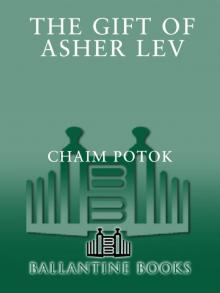 The Gift of Asher Lev
The Gift of Asher Lev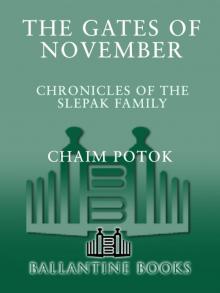 The Gates of November
The Gates of November In the Beginning
In the Beginning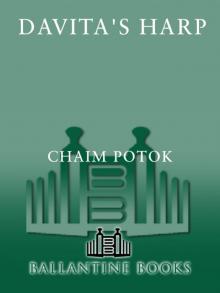 Davita's Harp
Davita's Harp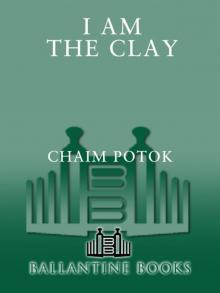 I Am the Clay
I Am the Clay The Promise
The Promise The Chosen
The Chosen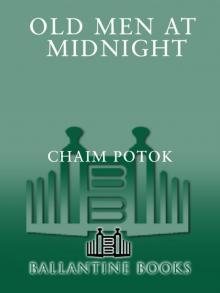 Old Men at Midnight
Old Men at Midnight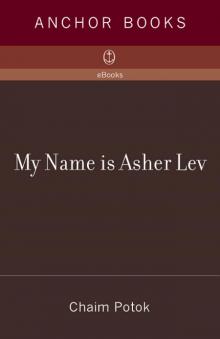 My Name Is Asher Lev
My Name Is Asher Lev